GALLUP NEWS SERVICE
PRINCETON, NJ -- Last week, the U.N. Security Council unanimously passed a resolution requiring Saddam Hussein to submit to tough weapons inspections or face "serious consequences." The Bush administration engaged in vigorous diplomatic activity to get the resolution passed, and is now preparing for a possible attack on Iraq. According to the latest CNN/USA Today/Gallup poll, a majority of Americans continue to express support for such military action in general, but only three in 10 would back war if the United Nations does not follow up with a specific resolution of authorization.
The weekend poll, conducted Nov. 8-10, shows that the public supports military action by a 59% to 35% margin when asked about it in a general sense without specified contingencies. These figures represent a slight increase in support from views expressed in late October, but are roughly in line with support levels measured in early September.
| Public Support for Invading Iraq 2001-2002 |
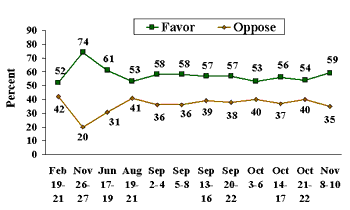 |
Americans are dubious that the U.N. resolution will persuade Saddam to permit weapons inspectors. Only 21% think Saddam will comply with the resolution, while 76% think he will not. These figures are essentially the same as those measured in September before the U.N. resolution was passed, when Americans expressed skepticism that any such resolution would affect Saddam's behavior.
| As you may know, the United Nations passed a resolution [today/Friday] that would require Iraq to allow U.N. inspectors into its country to search for weapons of mass destruction. Do you think Saddam Hussein will agree to inspections that meet the U.N.'s requirements, or not? |
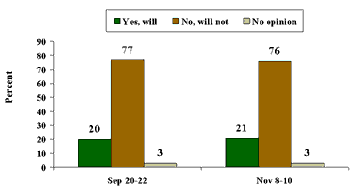 |
Americans are also skeptical that if Saddam agrees to the inspections, they will be effective in eliminating the threat of Iraq's use of weapons of mass destruction against the United States. The most recent figures, however, represent a slight increase in optimism over opinion measured last September about the effectiveness of the inspections.
| If the United Nations does conduct inspections, do you think these would -- or would not -- be effective in eliminating the threat of Iraq using weapons of mass destruction against the United States? |
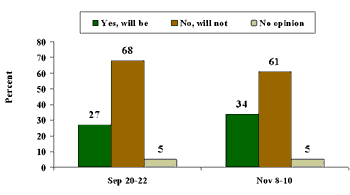 |
The 59% support level referred to above is based on a general question that specifies no contingencies. Gallup polling has continually shown, however, that the public wants U.N. and allied support before military action is initiated.
The most recent poll shows that Americans' support for an invasion of Iraq continues to be highly contingent on U.N. authorization. Only three in 10 Americans (31%) say that if Saddam does not comply with the U.N. resolution, the United States should invade Iraq with ground troops -- even if the United Nations does not vote to authorize the invasion. An additional four in 10 (40%) would favor the invasion if the United Nations gave its approval, giving a total of 71% of Americans in support. About one in four (24%) oppose any use of U.S. ground troops against Iraq, and 5% express no opinion.
| What Should U.S. Do if Saddam Does Not Comply With UN Resolution? |
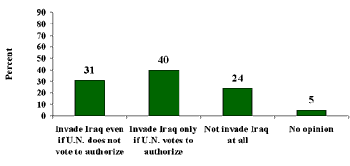 |
| Nov 8-10, 2002 |
Strong Partisan Reaction to Opinion on War with Iraq
The poll finds that Republicans and independents hold quite different views from Democrats, who express the greatest amount of opposition to a possible war with Iraq. This partisan differentiation is consistent with results from previous Gallup polls.
On the general question of invading Iraq with U.S. ground troops to remove Saddam Hussein from power, Republicans are in favor by 71% to 22%, and independents by 59% to 36%. Democrats oppose the action, by 52% to 43%.
| Public Support for Invading Iraq by Party |
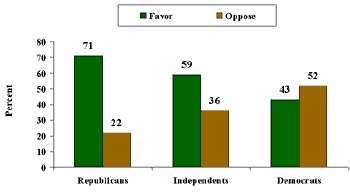 |
| Nov 8-10, 2002 |
Although there are some partisan differences in perceptions of how Saddam will react and whether the U.N. inspections would be effective, large majorities of all three groups agree -- Saddam will not permit inspections, but even if he does, the inspections are not likely to be effective.
Major partisan differences emerge on the question of what the United States should do if Saddam does not comply with the U.N. resolution. While 44% of Republicans would be willing for the United States to invade Iraq without authorization from the United Nations, only 15% of Democrats would be willing. Independents fall between the two groups, with 31% indicating they would favor a go-it-alone policy.
| Suppose Saddam Hussein does not comply with the United Nations resolution. Do you think the United States should invade Iraq with ground troops -- [ROTATED: only if the U.N. votes to authorize the use of U.S. ground troops, even if the U.N. does not vote to authorize the use of U.S. ground troops], or do you think the United States should not send ground troops to Iraq at all? |
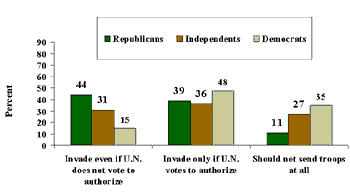 |
| Nov 8-10, 2002 |
Similarly, only 11% of Republicans oppose any use of troops, compared with 27% of independents and 35% of Democrats. Clear majorities of all three groups are obtained if the United Nations authorizes an invasion, though the size of each majority is different. With U.N. authorization, 83% of Republicans would support an invasion of Iraq, compared with 67% of independents, and 63% of Democrats.
Survey Methods
The latest results are based on telephone interviews with 1,014 national adults, aged 18+, conducted November 8-10, 2002. For results based on the total sample of National Adults, one can say with 95% confidence that the margin of sampling error is ±3 percentage points. In addition to sampling error, question wording and practical difficulties in conducting surveys can introduce error or bias into the findings of public opinion polls.
Would you favor or oppose invading Iraq with U.S. ground troops in an attempt to remove Saddam Hussein from power?
|
Favor |
Oppose |
No opinion |
||
|
% |
% |
% |
||
|
(NA) 2002 Nov 8-10 |
59 |
35 |
6 |
|
|
(NA) 2002 Oct 21-22 |
54 |
40 |
6 |
|
|
(NA) 2002 Oct 14-17 ^ |
56 |
37 |
7 |
|
|
(NA) 2002 Oct 3-6 |
53 |
40 |
7 |
|
|
(NA) 2002 Sep 20-22 ^ |
57 |
38 |
5 |
|
|
(NA) 2002 Sep 13-16 † |
57 |
39 |
4 |
|
|
(NA) 2002 Sep 5-8 ^ † |
58 |
36 |
6 |
|
|
(NA) 2002 Sep 2-4 † |
58 |
36 |
6 |
|
|
(NA) 2002 Aug 19-21 † |
53 |
41 |
6 |
|
|
(NA) 2002 Jun 17-19 ^ † |
61 |
31 |
8 |
|
|
(NA) 2001 Nov 26-27 ‡ |
74 |
20 |
6 |
|
|
(NA) 2001 Feb 19-21 ‡ |
52 |
42 |
6 |
|
|
(NA) 1993 Jun 29-30 ‡ |
70 |
27 |
3 |
|
|
(NA) 1992 Mar 30-Apr 5 ‡ ? |
55 |
40 |
5 |
|
|
^ |
Asked of half sample. |
|||
|
† |
WORDING: Would you favor or oppose sending American ground troops to the Persian Gulf in an attempt to remove Saddam Hussein from power in Iraq? |
|||
|
‡ |
WORDING: Would you favor or oppose sending American troops back to the Persian Gulf in order to remove Saddam Hussein from power in Iraq? |
|||
|
? |
Life Magazine/Gallup. |
|||
As you may know, the United Nations passed a resolution [today/Friday] that would require Iraq to allow U.N. inspectors into its country to search for weapons of mass destruction. Do you think Saddam Hussein will agree to inspections that meet the U.N.'s requirements, or not?
|
Yes, will |
No, will not |
No opinion |
||
|
(NA) 2002 Nov 8-10 |
21% |
76 |
3 |
|
|
(NA) 2002 Sep 20-22 ^ |
20% |
77 |
3 |
|
|
^ |
WORDING: As you may know, Iraq said it would allow U.N. inspectors into its country to search for weapons of mass destruction. Do you think Saddam Hussein will agree to inspections that meet the U.N.'s requirements, or not? |
|||
If the United Nations does conduct inspections, do you think these would -- or would not -- be effective in eliminating the threat of Iraq using weapons of mass destruction against the United States?
|
Yes, would be |
No, would not |
No opinion |
|
|
(NA) 2002 Nov 8-10 |
34% |
61 |
5 |
|
(NA) 2002 Sep 20-22 |
27% |
68 |
5 |
Suppose Saddam Hussein does not comply with the United Nations resolutions passed [today/on Friday]. Do you think the United States should invade Iraq with ground troops -- [ROTATED: only if the U.N. votes to authorize the use of U.S. ground troops, even if the U.N. does not vote to authorize the use of U.S. ground troops], or do you think the United States should not send ground troops to Iraq at all?
|
Only if |
Even if U.N. does not vote to authorize |
|
|
|
|
(NA) 2002 Nov 8-10 |
40% |
31 |
24 |
5 |
(NA) – National Adults
